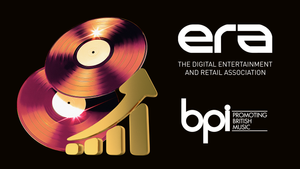Recorded music consumption and retail revenues in the UK reached an all-time high in 2024, which is good news all round assuming you’re happy to work with the industry’s methodology for combining streams with sales, and providing no one tries to adjust the revenue figures for inflation.
Music retail revenues last year - so money spent on both streaming subscriptions and physical discs - grew by 7.4% to £2.39 billion, topping the previous high of £2.22 billion in 2001, at the peak of the CD era. This is according to stats from ERA, the trade group for digital platforms and music retailers in the UK.
ERA CEO Kim Bayley says, “2024 was a banner year for music, with streaming and vinyl taking the sector to all-time-high records in both value and volume. This is the stunning culmination of music’s comeback which has seen sales more than double since their low point in 2013. We can now say definitively - music is back”.
Old-timers will remember that recorded music revenues slumped in the 2000s as the shift from physical to digital proved traumatic, with the sector losing more than half its income in a decade. Things started to turn around once the subscription streaming business model pioneered by the likes of Spotify gained momentum, resulting in a decade of growth, and last year’s all-time revenue high.
Though, of course, if you adjust the £2.22 billion generated in 2001 for inflation, there’s still some way to go before the record industry fully recovers from the 2000s crash. There are various ways of calculating inflation, but if you use the Bank Of England’s inflation calculator, that £2.22 billion in 2001 would be worth £4 billion now. Which is depressing. Let’s just remind ourselves that digital music is, in theory at least, more profitable than physical music, because you don’t have the manufacturing costs.
The vast majority of the £2.39 billion generated last year - around 86% - comes from the music streaming services, with streaming income up by 7.8% and exceeding £2 billion. However, as has been the trend for a few years now, physical sales also grew last year, mainly thanks to vinyl. Revenues generated by vinyl album sales were up 10.5% to £196 million, while CD album revenues were flat at £126.2 million.
Record label trade group BPI has also released its end-of-year stats, which look at units sold rather than revenues generated by physical discs. Those figures confirm that, while vinyl generates significantly more revenue than CD - and is behind the overall growth in physical revenues - more CDs are actually shifted than vinyl records, with 10.5 million CDs being sold compared to 6.7 million vinyl records. Vinyl retails at a higher price than CD, hence it being a bigger revenue generator.
The BPI also notes that, while catalogue sales have always played an important role in the vinyl revival and continue to do so, vinyl sales are not just about selling classic albums from the archives.
Seven of the ten best selling vinyl albums in 2024 were new releases, including Taylor Swift’s ‘The Tortured Poets Department’, Billie Eilish’s ‘Hit Me Hard And Soft’, Fontaines DC’s ‘Romance’, The Cure’s ‘Songs Of A Lost World’ and Charli XCX’s ‘Brat’.
In terms of music consumption, the industry has a methodology for mashing together streaming and sales data, ie how many tracks were streamed with how many discs were sold, in order to identify combined figures that supposedly identify how many albums were consumed.
It’s a somewhat dubious metric that makes direct comparisons of music consumption now with music consumption in the CD era slightly suspect.
But, if you want to do that anyway, by ERA’s maths music consumption in the UK last year reached the equivalent of 201.4 million albums (178 million being streamed), which exceeds the record of 172 million albums sold in 2004.
ERA’s stats also track trends in the video and gaming sectors. Both bring in significantly higher revenues than music, though the music sector scored the highest level of growth last year.
Revenues from video streaming services and the sale of DVDs and Blu-ray Discs were up 6.9% to £5 billion. Gaming revenues were down 4.4% - “following a drop in physical games sales of more than a third in twelve months”, ERA notes - coming in at £4.61 billion.

